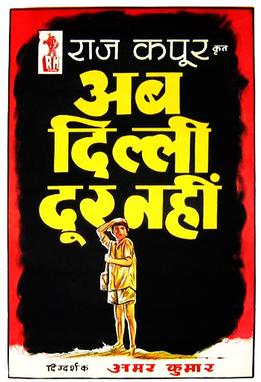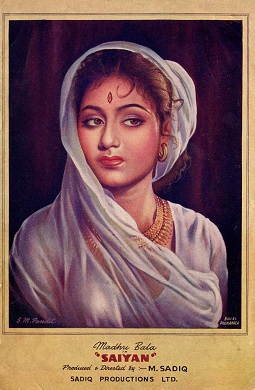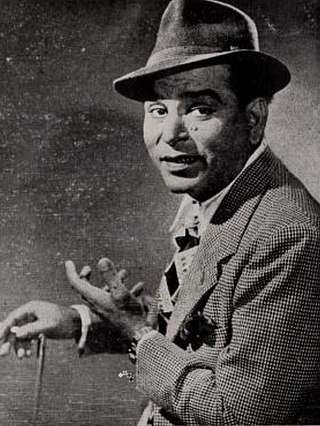Related Research Articles

Lata Mangeshkar was an Indian playback singer and occasional music composer. She is considered to be one of the greatest and most influential singers of the Indian subcontinent. Her voice was one of the unifying elements of the people of India, Pakistan, Bangladesh and Nepal. Her contribution to the Indian music industry in a career spanning eight decades gained her honorific titles such as the "Queen of Melody", "Nightingale of India", and "Voice of the Millennium".

Abdul Hayee, popularly known by his pen name (takhallus) Sahir Ludhianvi, was an Indian poet who wrote primarily in Urdu in addition to Hindi. He is regarded as one of the greatest film lyricist and poets of 20th century India.
Rajkumari Dubey, better known by her first name, Rajkumari, was an Indian playback singer who worked in Hindi cinema of 1930s and 1940s. Best known for her songs, "Sun Bairi Baalam Sach Bol Re" in Bawre Nain (1950), "Ghabaraa Ke Jo Hum Sar Ko Takraayan" in Mahal (1949) and "Najariya Ki Maari" in Pakeezah (1972).
Ghulam Haider (1908 – 9 November 1953), also known by the honorary title Master Ghulam Haider, was a Pakistani music composer who worked both in India and later in Pakistan after its independence in 1947.
Mubarak Begum was an Indian vocalist who sang in the Hindi and Urdu languages. She was a playback singer in Bollywood films during the 1950s and 1960s. She had also recorded and given public performances in a number of other genres, including Ghazal and Na`at.

Ab Dilli Dur Nahin is a 1957 Indian Hindi-language film directed by Amar Kumar and written by Rajinder Singh Bedi and Muhafiz Hyder. The film was produced by Raj Kapoor and starred Yakub, Anwar Hussain, Motilal, Nand Kishore and Jagdeep, and, in very minor role, Amjad Khan.

Aadhi Raat is an Indian Hindi-language film of 1950, directed by S. K. Ojha and starring Ashok Kumar, Nargis, Jeevan, Cuckoo, Kuldip Kaur, Neelam and Tiwari. The music was composed by Husnlal Bhagatram, while Geeta Dutt, Lata Mangeshkar and Meena Kapoor were the playback singers.
Nashad was a film composer and music director of Indian and Pakistani film industry. He composed music for Hindi films in the 1940s and 1950s, credited on-screen under the names Nashad and then later migrated to Pakistan in 1964.
Shaukat Ali, also known as Shaukat Ali Khan, was a Pakistani folk singer.

Saiyan (transl. "Beloved") is a 1951 Bollywood film-Hindi romantic drama directed by M. Sadiq for his Sadiq Productions Ltd. The story and screenplay were written by Azmi Bazidpuri. The music was composed by Sajjad Hussain, with lyrics written by D. N. Madhok, Rajendra Krishan and Hasrat Jaipuri. The film stars Madhubala, Ajit, Sajjan, and Jayant. It was both a critical and commercial success.

Gazal is a 1964 Urdu romance musical film directed by Ved-Madan, starring Sunil Dutt, Meena Kumari and Prithviraj Kapoor. The muslim social film is about the right of young generation to the marriage of their choice. It had music by Madan Mohan with lyrics by Sahir Ludhianvi, featuring notable filmi-ghazals such as "Rang Aur Noor Ki Baraat", performed by Mohammed Rafi and "Naghma O Sher Ki Saugaat", performed by Lata Mangeshkar.

Sajan is a 1969 Indian Bollywood film directed by Mohan Segal. It stars Manoj Kumar and Asha Parekh in pivotal roles. It became a hit at the box office.

Yakub Khan, known as Yakub, was an Indian actor born into a Pathan family in Jabalpur, Madhya Pradesh, India. He is best known for his comic and comic villainous roles.

Zohrabai Ambalewali was an Indian classical singer and playback singer in Hindi cinema in the 1930s and 1940s. She was considered one of the most popular female playback singers of early and mid 1940s.

Balam is a 1949 Hindi romantic action film directed by Homi Wadia. Credited as A Hila Wadia Production by Wadia Brothers the film starred Suraiya, Wasti, Masood, Nigar Sultana, Jayant, Gulnar and Agha. The music directors were Husnlal Bhagatram.

Naseem Banu was an Indian actress. She was referred to as Naseem. Starting her acting career in the mid-1930s she continued to act till mid-1950s. Her first film was Khoon Ka Khoon (Hamlet) (1935) with Sohrab Modi under whose Minerva Movietone banner she acted for several years. Her high-point came with Modi's Pukar (1939) in which she played the role of Empress Nur Jahan. According to composer Naushad she got the sobriquet Pari-Chehra Naseem through the publicity advertisements of her films. She was the mother of actress Saira Banu and mother-in-law to the actor Dilip Kumar.

Hamari Yaad Aayegi is a 1961 Hindi romantic drama film, written and directed by Kidar Sharma. Produced under the banner of Show People, the director of photography was D. C. Mehta. The music was composed by Snehal Bhatkar with lyrics by Kidar Sharma. The film had the well-known title song "Kabhi Tanhaiyon Mein Hamari Yaad Aayegi", sung by Mubarak Begum. The film featured the director's son Ashok Sharma in the main role along with Tanuja, Anant Kumar, Madhavi, Sujata and Rajinder Dube.

Bibbo was a music composer, singer and actress who worked in both Indian and Pakistani films. She acted in Indian cinema from 1931 to 1947 before moving to Pakistan, following Partition of India in 1947. She started her acting career with Ajanta Cinetone Ltd. in 1933, working with directors like M. D. Bhavnani and A. P. Kapoor. She was one of the top leading ladies of the 1930s along with actresses like Devika Rani, Durga Khote, Sulochana, Mehtab, Shanta Apte, Sabita Devi, Leela Desai and Naseem Banu. She was referred to as "one of the most important female stars of the 1930s and 1940s". Her fame had her featured in the lyrics of a popular song from the film Gharib Ke Lal (1939) sung by Mirza Musharraf and Kamla Karnataki, with music by Sagheer Asif and lyrics by Rafi Kashmiri. "Tujhe Bibbo Kahoon Ke Sulochana", where Sulochana referred to another popular actress of the time. This was the first time a song featuring famous actors was used in the lyrics of a film song.
References
- ↑ "Aiye (1949)". gomolo.com. Gomolo.com. Retrieved 4 February 2015.
- ↑ "Aiye (1949)". citwf.com. Alan Goble. Retrieved 4 February 2015.
- ↑ "Yakub - Interview (1954)". Cineplot. Cineplot. Retrieved 4 February 2015.
- ↑ "Aaiye (1949)". myswar.com. MySwar. Retrieved 4 February 2015.
- ↑ "Nostalgia Mubarak Begum -The singer who time forgot". Cineblitz. August 2013. Archived from the original on 4 February 2015. Retrieved 4 February 2015.